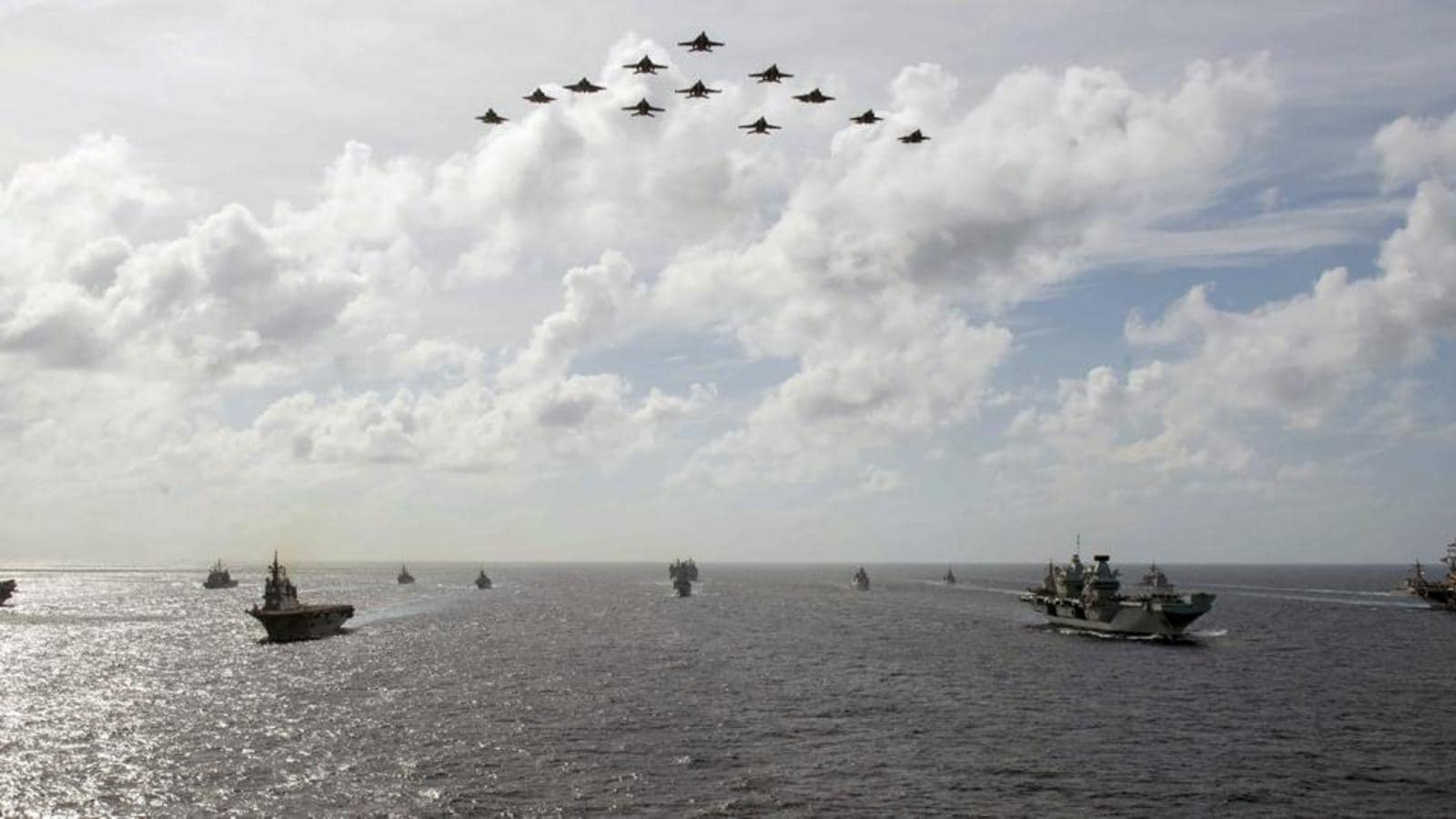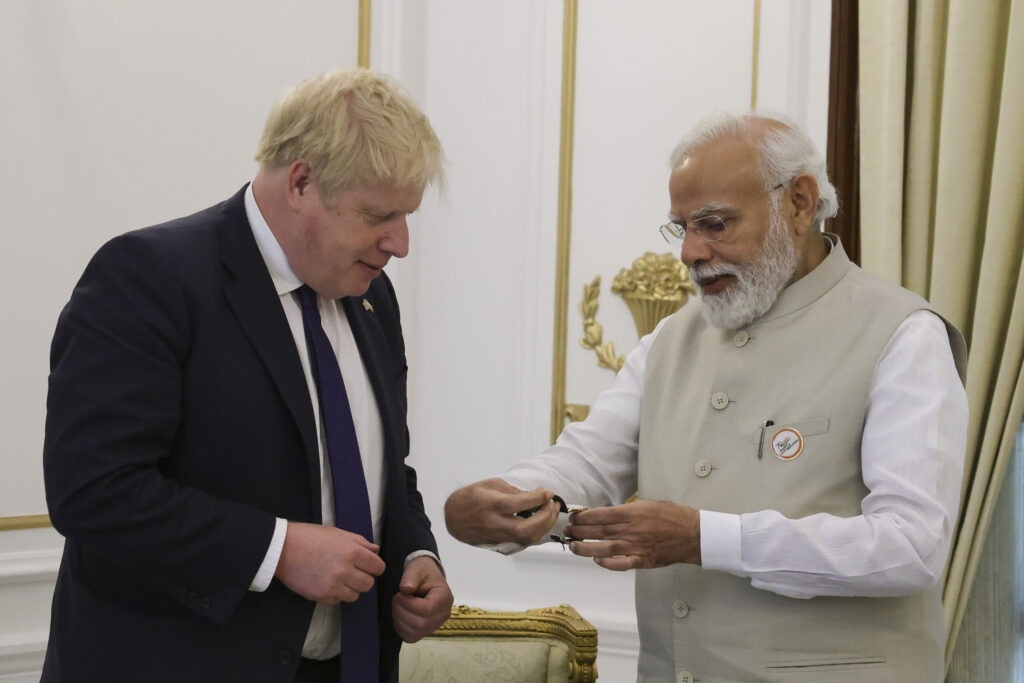UK-India Partnership And British Indo-Pacific Tilt

UK-India Partnership And British Indo-Pacific Tilt
In March 2021, the UK Government published an Integrated (IR) Review of Security, Defense, Development and Foreign Policy, a corner policy document outlining Britain’s transnational part after the UK departs from the European Union. It’s the first time the UK has officially launched its Global Britain program- the term was frequently used following Brexit but didn’t have clear pretensions and precedences.

The Integrated Review sets out the UK– India relations within the British Indo- Pacific environment and reflects significant attention to relations. The recreating references to India and the two- dimensional phase of the cooperation punctuate the eventuality of cooperation in the profitable, scientific, and technological fields. India and the United Kingdom reaffirmed their bilateral relationship with the” Strategic Partnership”, agreeing on a” 2030 Directive” to strengthen relations in areas like health, climate change, trade, education, wisdom and technology, and defence.
Still, due to Russia’s irruption of Ukraine, profitable recession in the epidemic, rising affectation, and the exile extremity, the UK’s capability to consolidate Indian relations and play an essential part in the Indo- Pacific is veritably limited. Although the UK is suitable to play a limited role in Asia, it has limited implicit in acting as a major security provider in the Indo- Pacific. Attempts to do so could also peril Britain’s part as a leading part of Euro-Atlantic security.
While the Indo- Pacific cock of the UK and the emphasis on cyber, position, defence, and other areas are a sign of UK ambition, in the UK, the UK will, in fact, be suitable to repel European security pitfalls.

Are British intentions in line with reality?
Seeking its new transnational part, the United Kingdom returns to eastern Suez after 50 times while simultaneously trying to articulate a renewed sense of commitment in the region. The recent deployment of Carrier Strike Group- 21( CSG- 21) to the Indo- Pacific demonstrates the United Kingdom’s commitment to expanding its indigenous security cooperation. During its 28- week distribution in the Indo- Pacific region in 2021, CSG- 21 visited India, shared in maritime exercises in July, and the first three-service exercise known as Konkan Shakti in October, and The UK is the ruling country, only the third country in which India operates three services.
While this post reflects a renewed indigenous commitment, there’s a threat of exaggerating the inclination towards the Indo- Pacific, especially in the Indian Ocean( IOR) region. It’s important that India understands the United Kingdom’s interests in the IOR and the challenges the UK will face in achieving its bournes.
The Indo- Pacific cock of the UK is likely to remain as much of a focus on the Pacific as it has not been mentioned by engaging with indigenous associations in the Indian Ocean.
First, despite wide IR reference to the Indo- Pacific region, the United Kingdom didn’t produce an Indo- Pacific strategic document, unlike other major European countries. In addition, Britain’s commitments are substantially in the Pacific concerning the Five-Power Protocol Agreements with ASEAN countries and the lately concluded AUKUS agreement.
In India’s view of the Indo- Pacific, the Indian Ocean is a major theatre. The UK’s Indo- Pacific may be as much of a focus on the Pacific as it has not been in contact with indigenous associations in the Indian Ocean.
Alternate, because of the extremity in Ukraine, it’ll be delicate for the United Kingdom to maintain its military commitment in the Indian Ocean. The United Kingdom presently holds seven endless points at IOR Bahrain, Oman, Kenya, Brunei, Singapore, Diego Garcia, and Qatar. It’s insolvable to stretch beyond these foundations in view of the critical reality of European security.
Also, the Gulf no longer serves as a special source of energy for the United Kingdom, meaning that London has a lower provocation to operate in the region moment than in the twentieth century. Utmost of the UK’s oil painting comes from Norway and Nigeria, so it doesn’t depend on energy coffers in the IOR.
Third, the UK faces domestic challenges. England, Scotland, Wales, and Northern Ireland are more different than ever due to profitable indigenous differences. Challenges are aggravated by affectation and profitable recession following the epidemic, as well as the recent political insecurity in Northern Ireland, with the Sinn Fein party, which supports the reunification of the Irish, gaining maturity in the indigenous choices. As a result, London will need to prioritize domestic issues over its vibrant Indo- Pacific strategy.
Fourth, the Russian irruption has formerly again concentrated on the UK’s security in Europe, as the UK aims to play a crucial part in arming Ukraine and strengthening NATO defence in neighbouring countries. London presently leads the Joint Expeditionary Force and six other small European countries. The Royal Navy plays a crucial part in the ocean as NATO‘s nonmilitary headquarters is grounded in London.
A significant portion of the UK’s maritime coffers will probably be depleted in the Mediterranean, Baltic, and North Sea areas, limiting the UK’s plans for Indo- Pacific expansion. Lately, the U.S. Secretary of Defense Lloyd J. Austin echoed this sentiment, saying,” Britain can be veritably useful as a coalition if it doesn’t concentrate on Asia”. With clear dispatches from the US service, the UK is likely to delay the fulfilment of its Indo-Pacific intentions.
Eventually, not all countries in the Indian Ocean were enthusiastic about the there-established British presence in the region; one of India’s most significant problems with Britain’s continued conflict is the ongoing conflict over the control of the Chagos islets between the UK and Mauritius, which has been tense since the Cold War. India and the United States are in a veritably precarious position due to the British situation, despite the astonishing transnational support in favour of Mauritius.
Since Mauritius has been attesting its claims by asking Google to list the Chagos islets as part of its home and later as part of its ongoing sweats to restore control of the Chagos islets from Britain, the Mauritian government has hired a boat to visit the Blenheim Reef after the advertisement the English government. But the UK government continues to maintain that the islet is part of British Indian Ocean Territory.
The Way Forward Supporting Regional Governance
Given the United Kingdom’s commitment to Europe, domestic insecurity, and indigenous conflict with Mauritius, strengthening indigenous resistance centres is an effective strategy to cover the Indian Ocean region rather than using force. In India, the Indian Ocean Rim Association (IORA) and the Indian Ocean Naval Symposium (IONS) are the two most crucial maritime operation structures in the Indian Ocean Region.
The UK’s Indo- Pacific strategy shouldn’t duplicate the security part played by the United States and India. Instead, it should concentrate on its capability to work together, cooperate, and cooperate with transnational governance.
The UK can play a formative part in erecting an indigenous governance armature. Presently, the United Kingdom is a negotiating mate for IORA, but sweats should be made to promote full class, as the French class is developed by 2020.
In addition, the IONS is important because it works to combat China by erecting military trouble that the IOR doesn’t include Beijing in full participation and promotes military cooperation with countries that advise of China’s expansion in the region, similar as the United Kingdom, Australia, and France. As stated in a 2021 common statement, the UK has appointed a dispatches officer at India’s Information Fusion Center in Gurgaon.
In addition, the UK must engage nationally with the EU, particularly France and Germany, in order to maintain stability in the Indian Ocean region. Inclusively known as the E3, the three businesses have achieved common public success in history. They have been at the van of transnational sweats to keep Iran’s nuclear deal alive, indeed, during the Trump administration. The Persian Gulf is India’s most important energy security region, so the former E3 experience of working with the businesses in this region will be backing India.
Eventually, although there’s an ongoing desire for British foreign policy to share in all world affairs, it’s essential that the UK mustn’t consider itself as a major indigenous authority in the Indian Ocean. The UK’s Indo- Pacific strategy shouldn’t duplicate the security part played by the United States and India and should rather concentrate on its capability to work together, make cooperation, and transnational governance. Both the United Kingdom and its abettors in the Indian Ocean region will profit from clarifying precedences in Britain and embrace the fact that although the UK should be a significant supplier of defence to Europe, it’ll not be in the Indo- Pacific.
Edited by Prakriti Arora





